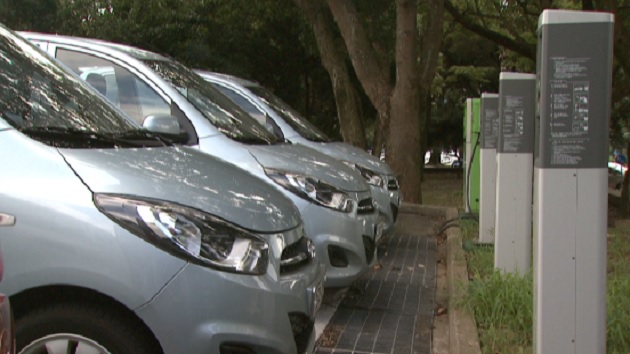
The local government cut another 4 million won off its subsidy for electric vehicle purchases this year. As Mike Laidman now reports, that has led some people who had reserved an electric vehicle to rethink that decision.
The purchase subsidies for EVs have dropped to less than 14 million won this year.
[slug]
Electric vehicle subsidies cut by ₩4m to ₩14m
That's a four million won cut, and not helpful when the price of popular EVs like the Kona or Niro is over 50 million won.
[slug]
Some EV buyers have to pay ₩35m+
And, with EV manufacturers failing to meet demand, potential customers are left waiting more than six months from their order date for their car to be delivered.
Last year, subsidies for EVs sat at 18 million won.
Those who ordered a vehicle last year expecting 18 million wons worth of aid but haven't yet taken delivery are upset with the cut.
INTERVIEW
Prospective buyer
I was planning to pay 35 million won for the car we ordered, and that’s already a lot. Now, I have to pay 4 million won more, so I’m reconsidering the purchase.
인터뷰)전기차 주문 운전자
저희가 사려고 했던 전기차 요금 3천 500만원도 많다고 생각하고 있는데 400만원이 더 오른다고 하면 다시 한번 생각해 봐야겠다.
Additionally, sufficient EV charging stations have failed to have been built on time.
[slug]
Benefits for EV owners being phased out
Free charging at public facilities and parking fee waivers are two more EV benefits that now find themselves on the chopping block.
Truly, the benefits for EV owners are shrinking.
[slug]
Province ‘to focus on infrastructure growth’
The province says it will instead focus more on the qualitative growth of the needed infrastructure, like building more charging facilities, instead of merely increasing the number of EVs.
It added that a subsidy cut is unavoidable, and is encouraging EV manufacturers to speed up deliveries.
INTERVIEW
Moon Gyeong-sam / Provincial representative
The province's EV policy has been focused on purchase subsidies. Those will be gradually decreased and we will begin focusing more on EV infrastructure.
인터뷰)문경삼 제주특별자치도 탄소없는 제주정책과장
지금까지 전기차를 보조금 지원 정책으로 많이 가 있다. (앞으로) 보조금은 단계적으로 줄이되 문화확산을 통한 전기차 보급 확산 정책으로 갈 겁니다.
There are about 15,000 electric vehicles running on the island's roads, accounting for 4 percent of total vehicle numbers.
[Reporter] Mike Laidman
[Camera] Park Byeong-joon
But with the benefits of buying and operating an EV slowly vanishing, Jeju’s plan for an all-electric 2030 is looking more and more unachievable.
Mike Laidman, KCTV





